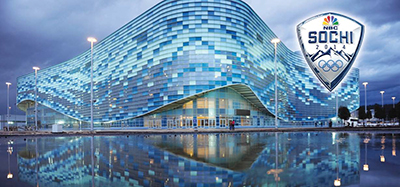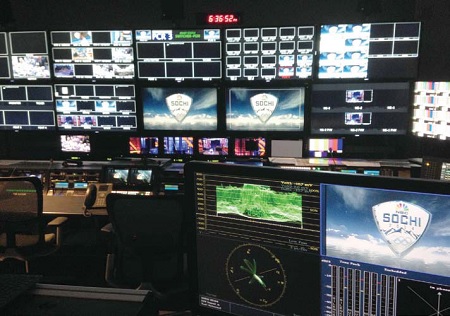NBC Expands Olympics Multiplatform Coverage

The Iceberg Skating Palace in Olympic Park
SOCHI, RUSSIA—With its planned coverage of the 2014 Olympic Winter Games in Sochi, NBC Sports Group is once again pushing the envelope of IP-based, multiplatform video production.
This time, Web content is the big winner. Besides the traditional mix of live Web streams, VOD and clips, NBC is creating a series of fully-produced/anchored Web-only Olympic TV shows for viewers on smartphones, tablets, and PCs.
IP has become the dominant transmission standard for NBC’s Olympics production. “In fact, almost everything we do will be moving by IP,” said David Mazza, senior vice president and chief technology officer of NBC Sports Group and NBC Olympics. “With the exception of a few hard lines for backup, our coverage will be moving via two 10G fiber-optic pipes from Sochi to our 300,000 square-foot production center in Stamford, Conn., and 30 Rock in New York City.”
The content will be a mix of JPEG2000 and Ericsson-encoded MPEG-4 video streams. The J2K and some of the MPEG- 4 streams will be fed into Medialinks MD8000 HD over IP transmission devices, while the rest of the MPEG-4 streams will travel over Cisco IP routers—all of which will travel over the two 10G circuits provided by Rostelecom and AT&T. There will be 55 HD feeds from Sochi to Stamford, and 14 U.S. feeds from Stamford to Sochi.
As for NBC’s Avid media asset management system? What was a cutting-edge production solution at the 2008 Beijing Olympics has now become “business as usual.”
“We’ve not only worked the bugs out of our MAM, but set it up as our main production system in Stamford,” Mazza explained. “As a result, for this Games, we are just ‘remoting’ the system out of Stamford, with the major functionality being handled back there.”
Get the TV Tech Newsletter
The professional video industry's #1 source for news, trends and product and tech information. Sign up below.
WEB MOVES UP IN IMPORTANCE
With plans to produce 539 hours of broadcast programming during the Games’ two week run Feb.7–23—103 hours more than it produced at the 2010 Winter Olympics in Vancouver—television remains the star player for NBC in Sochi. Content will be shown on NBC (185 hours), NBC Sports Network (NBCSN; 230) CNBC (36), MSNBC (45), and USA Network (43).
However, the network plans to provide more than a thousand hours of live streaming, VOD content and clips on NBCOlympics. com. And that’s not all: In an effort to attract “people who are at their desks,” NBCOlympics.com will produce live anchored coverage from 7 a.m. to 3 p.m. ET. The “Gold Zone” show, modeled after the NFL’s “Red Zone,” will be produced with its own control room and studio in Stamford. “Gold Zone will move from event to event, spending some time at each to give viewers a sense of what’s happening,” Mazza said.
NBCOlympics.com will also produce “Olympic Ice,” a half-hour 5:30 p.m. ET streaming video show focused on figure skating, and “Olympics News Desk,” a series of short Olympics news updates briefs streamed throughout the day and anchored by Comcast SportsNet host Julie Donaldson. Gold Zone and Olympics Ice will only be available to authenticated cable/satellite TV subscribers while Olympics News Desk will be open to the public. The network has also created a free “NBC Sports Live Extra App,” for Android and iOS and aimed at authenticated cable and satellite TV subscribers.

The master control room in Stamford, Conn., will serve as the production hub for NBC Sports’ Sochi coverage.
NBC has tapped Akamai to help it stream all 98 Olympic events, including every medal competition, event highlights, and athlete interviews and profiles.
“We will be providing authenticated viewers with direct access to NBC’s live coverage, and storing/serving its VOD content as needed,” said Kurt Michel, Akamai’s product marketing director. “With over 140,000 servers in 90 countries over 1,200 networks, we have the capacity to keep up with peak demand; even during the Olympics.”
REAL TECH AND VIRTUAL ENHANCEMENTS
NBC only had a gap of 17 months between the 2012 London Games and the 2014 Sochi Games. “As a result, there really wasn’t time to develop and properly test a range of new systems,” Mazza said. “This is why the core of what we’re bringing to Sochi is very much what we had in London.”
Nevertheless, NBC’s Sochi operation is impressive in its own right. The network is bringing about 2,000 people to man its two large studios in the International Broadcast Center, the various Games venues, and the Mountain Broadcast Center in the hills where skiing and other Alpine events are being held.
As for equipment, NBC will be using Sony MVS-7000X production switchers, Sony OLED monitors, ChyronHego Mosaic XL efX graphics generators, and Snell Alchemist standards converters to bring European 1080i/50hz video into the North American 1080i/60hz realm. Video infrastructure will be based on Miranda, including Kaleido K2 multi-image processors. “All of the IBC was wired and integrated by Sony’s team of veteran engineers and installers,” Mazza said.
NBC will once again produce the Olympics in 5.1 surround sound, which—like HD—has become a de facto standard. To do this, they will employ two 72-fader Calrec Artemis Shine audio consoles plus three smaller Artemis Beam consoles; namely a 40 fader unit and two 24 fader units. The mix will be enhanced using Linear Acoustics UpMax v4 Surround Sound Processors.
Signal routing will be handled via PESA routing systems, plus Cisco routing and networking, Videoscape cloud-based IPTV and DVR systems. Web content will be packaged using iStreamPlanet encoding and Microsoft’s Windows Azure Media Services.
In Sochi, NBC will have video eyes everywhere: “We will have around 150 cameras, compared to the host broadcaster’s [Olympic Broadcast Services] 450 cameras,” said Chip Adams, NBC Olympics vice president of venue engineering. “At the IBC and the venues, we’ll mainly be using Sony HDC-2500 HD cameras. Our ENG cameras will be a mix of Sony’s new PMW-400 and PWF-800 XDCAM 4:2:2 Long GOP camcorders outfitted with Canon 22x1 and 14x1 wide-angle ENG lens systems. On the field of play, there will be also a number of 86x and 100x Canon lenses.”
In the 4K arena, the network intends to use the same For-A/Evertz Dreamcatcher 4K replay system that it employed for the 2013 NHL Stanley Cup series. This system will allow NBC to maximize the resolution of digitally zoomed shots (i.e. 1080i or better) during its ice hockey coverage.
As well, “we will have two camera people using Sony F55 CineAlta 4K camcorders,” Mazza said. “Their 4K content will be sent to Denver and also downconverted to HD for the broadcast. They will also be shooting 4K footage in and around the Games, which will be sent back to Comcast in Denver and transmitted across the Comcast network to a few 4K demo sites.”
A total of 45 Avid Media Composer Edit Seats, aided by ISIS storage, and Interplay will handle editing duties. File-based movement will be handled by NBC’s Avid Media Asset Management system, ingesting video from 40 channels of Harmonic Media Decks, plus 300TB Media Grid storage pools located in Sochi and Stamford’s Highlights Factory production unit. Meanwhile, all truck replays and live playback video will be recorded using 60 EVS XT2/ XT3 HD video servers, and 40 IP Directors. “The Avids, Harmonics, EVS and even the SpectraLogic/SGL Tape Archive in Stamford can all share files back and forth seamlessly,” Mazza said.
To add a sense of difference to its Sochi coverage, NBC will make a number of virtual enhancements in concert or collaboration with OBS. For instance, “the competitors will be wearing GPS transceivers that will allow us to capture and broadcast a new range of real-time data,” said Michael Sheehan, NBC Olympics’ coordinating director of production. “During bobsled runs, for instance, we will be able to capture the speed and G-force of the sled being shown on air, and detect when the brakes have been applied. There is a plethora of other virtual innovations as well, but they are too numerous to mention.”
PREPARATION CHALLENGES
Preparing for the Sochi Games in less than 18 months has been one of NBC’s major challenges. Making things happen in Sochi has been the other.
“Getting things running here has been relatively straightforward, except for the unknown animal who chewed through one of our 1,500-meter stretches of fiber-optic cable during a recent thaw,” Adams said. “But moving around the Olympics site can be a problem if the roads are clogged with snow—and that could happen during the Games. That being said, the cluster of sites—both city and mountain—are arguably the most convenient in Winter Games history.”
Nevertheless, NBC is primed to produce the most varied multiplatform Olympics coverage of its career. “We’ve learned what people like not just on TV, but on their tablets and smartphones,” Mazza said. “In terms of content and the equipment needed to produce it, we’re ready.”
James Careless is an award-winning journalist who has written for TV Technology since the 1990s. He has covered HDTV from the days of the six competing HDTV formats that led to the 1993 Grand Alliance, and onwards through ATSC 3.0 and OTT. He also writes for Radio World, along with other publications in aerospace, defense, public safety, streaming media, plus the amusement park industry for something different.

